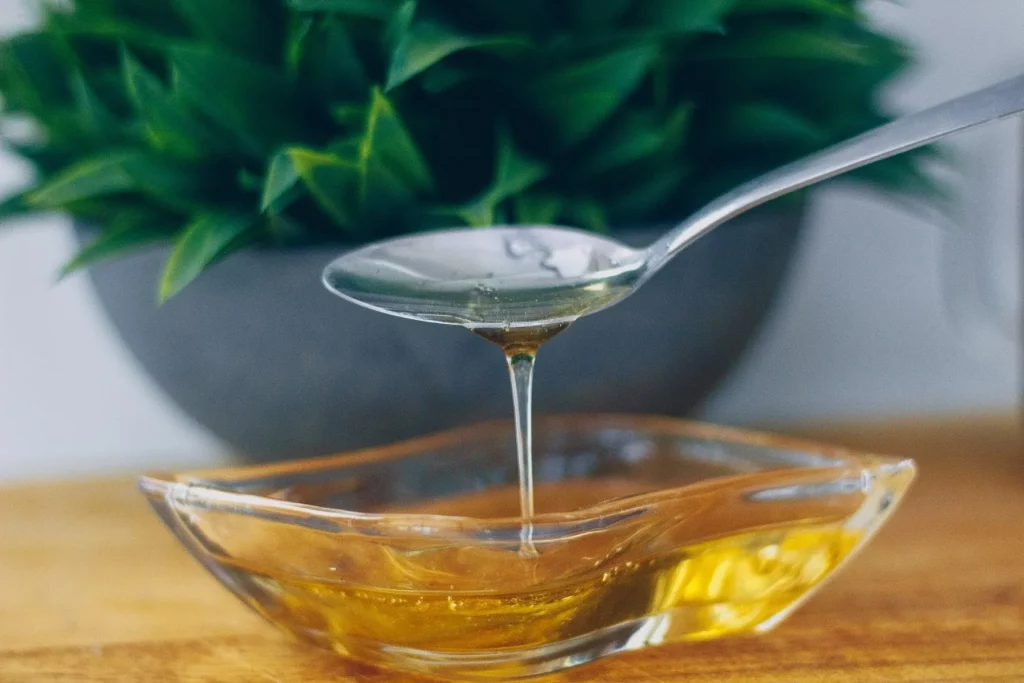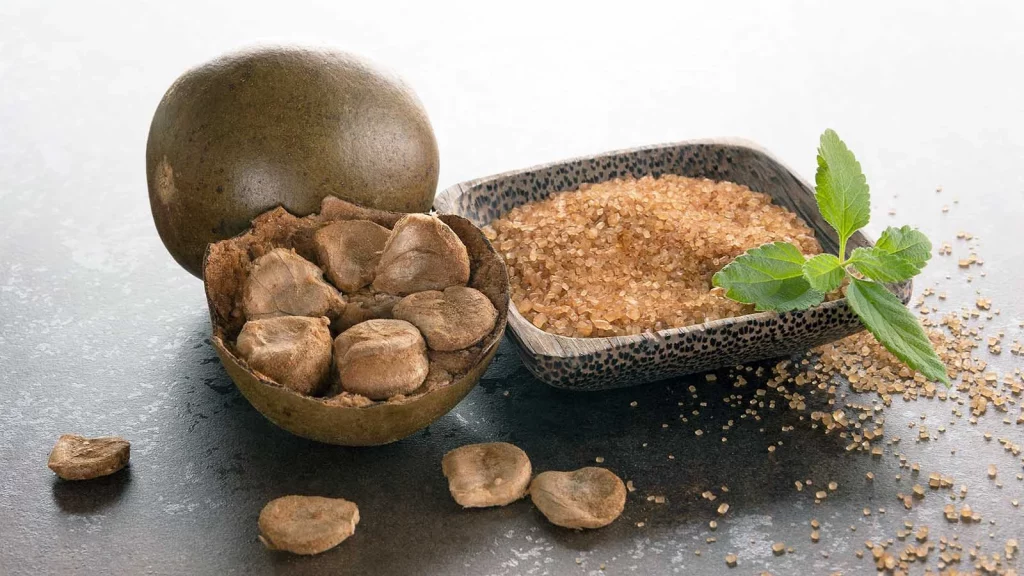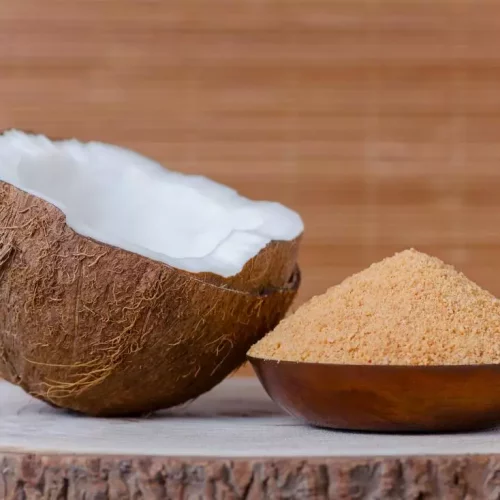[ad_1]
You are looking for the best coconut sugar substitutes, which tells me you know it well. Coconut sugar is a popular sweetener used in baking recipes as well as a substitute for its sugar counterparts. I had to deal with an unfortunate situation of being out of it, and I am here to tell you what helped me get through it.
If you are out of coconut sugar, you need the help of some of the best substitutes for it. Do you know them? Some of the best coconut sugar substitutes are brown sugar, maple sugar, date sugar, turbinado sugar, agave syrup, molasses, and stevia.
Coconut sugar is a kind of sugar that is obtained from the sap of coconut palm. It is a natural sweetener often used as a replacement for refined and artificial sweeteners. It is known as jaggery, pol hakuru, gula Jawa, Gulu malacca, and malacca sugar.
If there comes a time when you find yourself out of coconut sugar in your pantry, the best coconut sugar substitutes should get the job done for you. But before we get to its substitutes, let us explore coconut sugar.
Quick Peek: Coconut Sugar

The following scribbles tell you coconut sugar’s flavor, texture, culinary uses, and health benefits.
What Is Coconut Sugar?
Coconut sugar is the natural sugar that is sourced from the sap of coconut palm. It is used as a sweetener in many cuisines around the world. It is available in many forms – granules, crystals, blocks, and liquid.
Describing Coconut Sugar: Flavor and Texture
Coconut sugar is basically a sweetener, and you can easily surmise its flavor. The sweet flavor of coconut sugar is dependent on the type of coconut used for production. That said, coconut sugar has a subtly sweet taste and a caramel flavor. It has a texture similar to brown sugar, so it has a coarse texture. Contrary to popular belief, coconut sugar doesn’t give you a coconut flavor.
How Is Coconut Sugar Different From Regular Sugar?
Coconut sugar is different from regular sugar with respect to the glycemic index. Coconut sugar has a low glycemic index. This means that it doesn’t mess with the blood glucose level and thus will not affect the sugar level.
Uses of Coconut Sugar
Coconut sugar is a natural sweetener used in sweets and dessert recipes. It can be used in recipes that call for brown sugar or white sugar. It can also be used as a substitute for sugars derived from corn, maple, and agave.
It is good for preparing cookies, candies, granola bars, cupcakes, brownies, crackles, desserts, cheesecakes, rolls, muffins, and cakes. Some recipes made using coconut sugar are sweet potato casserole, peanut butter oat cookies, chocolate chip blondies, and oatmeal cookies.
Coconut Sugar On The Health Radar | Looking Through The Wellness Telescope
Coconut sugar contains potassium, magnesium, and sodium, which help regulate the water content in your body as well as for the proper functioning of the heart, muscles, and nerves. It is also a good source of vitamin C and raw antioxidants.
Coconut sugar is also a good source of healthy fats, which are beneficial in reducing the risk of heart diseases and high cholesterol. Inulin is a type of dietary fiber that is present in coconut sugar. Inulin helps in preventing colon cancer and balancing blood sugar.
That said, coconut sugar can’t be deemed a supremely healthy sweetener. Even though it has health benefits, it is still sugar and not so rich in nutrients. Thus, its consumption has to be limited.
Why Should We Substitute Coconut Sugar?
Coconut sugar is a highly demanded natural sweetener, and with increasing demand, it can easily become unavailable. Thus it is necessary to find some best substitutes for coconut sugar. Also, with high demand comes high costs.
Coconut sugar is fairly expensive when it comes to other types of sugars. In that case, it would be helpful if you knew the best substitutes for it. So, shall we talk about the best coconut sugar substitutes right away?
14 Best Coconut Sugar Substitutes
Now that you know everything you need to know about coconut sugar let us discuss the fourteen best substitutes for coconut sugar.
1. Brown Sugar

Brown sugar is made with a mixture of white sugar and molasses. Molasses are added to boiling sugar crystals. It can be fully or partially refined. There are two types of brown sugar – light, and dark. Light brown sugar is made by adding a little quantity of molasses to sugar. Dark brown sugar uses nearly twice the amount of molasses added in light brown sugar.
Brown sugar has an intense caramel-like flavor due to the addition of molasses. Brown sugar is used for rich and dense baked goods such as cookies and bread, as well as in glazes and sauces. Light brown sugar or dark brown sugar is one of the best coconut sugar substitutes due to its flavor profile. For a cup of coconut sugar, use ¾ cup of brown sugar.
2. Maple Sugar

Maple sugar is the sugar obtained from the sap of the maple tree. Maple syrup is boiled until the liquid is evaporated. The remnant is the granulated maple sugar. It is yellowish-brown in color and has a caramel-like nutty flavor. Maple sugar’s texture is quite similar to sugar.
Maple sugar is another best coconut sugar substitute due to its sweet, caramel flavor. It can be substituted for coconut sugar in an equal ratio. Using the maple sugar obtained from the sugar maple tree would give you the best results. For a cup of coconut sugar, use ¾ cup of maple sugar.
3. Date Sugar

Date sugar is prepared using dehydrated dates, which are ground to a sugar-like form. It means that date sugar is not sugar per se. Since the whole dates are used to prepare date sugar, the fiber exists in the sugar, which doesn’t dissolve easily.
Date sugar has a sweet but rich caramel flavor and a soft, smooth texture. Due to its flavor profile, date sugar is a considerable substitute for coconut sugar. In the case of beverages, date sugar might not be a considerable option since it doesn’t dissolve easily. You can use a cup of date sugar to replace a cup of coconut sugar.
4. Turbinado Sugar

Turbinado sugar is a kind of raw sugar obtained from sugarcane that undergoes minimal processing. It is golden-brown in color naturally but turns white when molasses is discarded. It has a caramel flavor and large, coarse sugar crystals.
Turbinado sugar is a worthy substitute for coconut sugar due to the caramel flavor it has, as well as a crumbly texture similar to coconut sugar. It can be sprinkled on muffins, scones, bread, and roasted veggies. It can also be used as a spice rub on grilled meat or poultry. It can be used to substitute for coconut sugar in an equal ratio.
5. Demerara Sugar

Demerara sugar is yet another raw cane sugar that is produced from sugarcane. It is golden-brown in color with large grains. It is used in baking recipes to give a nice, crunchy texture. Demerara sugar is often assumed to be the same as turbinado sugar, but these have slight differences.
Demerara sugar has a deep flavor like molasses with a subtle caramel taste. The mild flavor profile of demerara sugar makes it a considerable substitute for coconut sugar. It has a high glycemic index compared to coconut sugar, so you have to be careful with the amount.
6. Sucanat

Sucanat is short for sucre de cane naturel, which means natural cane sugar. It is a type of natural cane sugar obtained from sugarcane juice that is processed. Sugarcane juice is heated until it becomes a thick syrup. The syrup is then cooled to form granules.
Sucanat has a strong sweet flavor as that of molasses and a coarse texture and thus can be used as a substitute for coconut sugar. Being coarse in texture, it may not dissolve easily. The coarse granules can be used on baked goods. If you want a smooth texture, you can blend it using a food processor.
7. Piloncillo

Piloncillo is a raw cane sugar made by boiling cane sugar juice. This is then poured into molds and cooled, which hardens eventually. The word piloncillo means pylon, referring to its conical shape. There are two types of piloncillo – Blanco (light) and oscuro (dark). Blanco has a mild flavor, while Oscuro has a rich flavor.
Piloncillo has a flavor like burnt caramel with subtle hints of rum flavor. You can experience a mildly acidic finish as an aftertaste. It has a hard texture as well. Piloncillo can be used as a substitute for cane sugar due to its intense sweet flavor. The hard pieces of piloncillo can be broken into small bits and used instead of coconut sugar in recipes.
8. Honey

Honey is the sweet liquid that honeybees extract from the nectar of flowers. It is a natural sweetener used in recipes for its intense sweet flavor. It functions as an anti-inflammatory, antioxidant and antibacterial agent.
Honey is the best liquid substitute for coconut sugar due to its sweet flavor and syrupy consistency. Using raw honey in place of coconut sugar will give you better results in terms of taste as well as nutritional value. That is because raw honey loses its nutritional value after it undergoes processing. To replace a cup of coconut sugar, use ¼ of the cup of honey.
9. Maple Syrup

You get maple syrup when you boil the sap of maple trees. The sap is collected and cooked to become a delicious syrup. It has a complex flavor like maple with subtle hints of vanilla and caramel. Apart from pure maple syrup, imitation maple syrup is also sold – known as pancake syrup. This makes use of corn syrup as well.
Maple syrup is a good substitute for coconut sugar, considering the fact that it has a subtle caramel flavor. Since this substitute is liquid and syrupy, you might have to adjust the ingredients in your recipe accordingly. You can have ¼ cup of maple syrup for a cup of coconut sugar.
10. Agave Syrup

Also known as agave nectar, agave syrup is sourced from blue agave. It tastes similar to honey but has a thin consistency. Unlike other sweeteners, agave syrup lacks an aftertaste which makes it unique. It is available in many varieties – light, amber, dark, and raw.
Agave syrup has a sweet flavor similar to honey and thus is a considerable substitute for coconut sugar. It has a low GI index similar to coconut sugar and can be used to replace coconut sugar in recipes. You can use ¼ of the cup of agave syrup for a cup of coconut sugar.
11. Molasses

Molasses is a product obtained from refining sugar or sugar canes. It is a thick, shiny syrup with a dark brown color. It is available in two varieties – light molasses and dark molasses. It is used in baking recipes as well as to make rum and candies.
Molasses have a sweet, smoky flavor and a syrupy consistency. Molasses is a worthy coconut sugar substitute due to its sweet flavor and nutritional values. You can use a cup of white sugar mixed with a tablespoon of molasses to replace a cup of coconut sugar.
12. Brown Rice Syrup

Brown rice syrup is made using brown rice. Brown rice is cooked and subjected to natural enzymes with the help of barley. The starch in the rice is broken down into healthy sugars. The remnant mixture is boiled to reach a syrupy consistency.
Brown rice syrup has a mild, sweet, and nutty flavor and a thick consistency similar to honey. Due to the sweet flavor profile, brown rice syrup can be used as a substitute for coconut sugar. But the biggest downside is that this substitute lacks many nutrients and is high in calories. You can use ¾ cup of brown rice syrup for a cup of coconut sugar.
13. Monk Fruit

Monk fruit, also known as Luo Han Guo and Swingle fruit, is a small, round fruit. It is mostly seen in China but is quite popular as a natural sweetener with zero calories. Monk fruit is one of the healthiest substitutes for coconut sugar. The presence of antioxidants gives the characteristic sweetness to monk fruit. It tastes 200 times sweeter than sugar.
Monk fruit has a strong sweet flavor and doesn’t have the aftertaste that most artificial sweeteners have, making it a healthy coconut sugar substitute. The general consensus is to replace a cup of coconut sugar with monk fruit sweetener. But always be mindful of the quantity before substituting.
14. Stevia

Stevia, from the plant Stevia rebaudiana, is another natural sweetener that adds zero calories and carbohydrates. It is available in both liquid and granulated forms. Liquid stevia sweetener tastes sweeter than granulated stevia.
Stevia has a mild, licorice-like flavor and a bitter aftertaste. Stevia is a plant-based coconut sugar substitute that is also a healthy choice. Since stevia is sweeter than coconut sugar, you may use half a cup of stevia sweetener to replace a cup of coconut sugar.
Short Recap Of Best Coconut Sugar Substitutes
That must have been an exhaustive read on the best coconut sugar substitutes, right? Let me make it easy for you to remember the details with the help of some points.
Best Coconut Sugar Substitutes In Terms of Flavor-
- Brown Sugar
- Maple Sugar
- Raw Honey
- Molasses
- Stevia
Best Coconut Sugar Substitutes In Terms of Texture-
- Brown Sugar
- Maple Sugar
- Date Sugar
- Turbinado Sugar
- Demerara Sugar
- Sucanat
Best Coconut Sugar Substitutes That Are Liquids-
- Honey
- Maple Syrup
- Agave Syrup
- Molasses
- Brown Rice Syrup
Best Coconut Sugar Substitutes That Are Healthy Options-
- Monk Fruit
- Stevia
Final Musings
That was all about the details on the best coconut sugar substitutes. The substitutes are sugar-based as well as syrups. You can use the substitutes depending on the preferences of sweetness in recipes. Try these out, and let me know what works best for you. See you soon with another list of substitutes!
How To Use Coconut Sugar Substitutes In A Recipe

Coconut Sugar Substitutes
If you are planning to bake some cookies using coconut sugar and find yourself out of coconut sugar, don’t worry. Take a deep breath and use these substitutes. Some of the best coconut sugar substitutes are brown sugar, maple sugar, date sugar, turbinado sugar, agave syrup, molasses, and stevia.
- Brown Sugar
- Maple Sugar
- Date Sugar
- Turbinado Sugar
- Demerara Sugar
- Sucanat
- Piloncillo
- Honey
- Maple Syrup
- Agave Syrup
- Molasses
- Brown Rice Syrup
- Monk Fruit
- Stevia
-
Go through the substitutes and see which one seems fit for the recipe.
-
Collect your ingredients and use your preferred substitute.
-
Use the substitute in the required amount and proceed to make the dish according to the recipe.
Frequently Asked Questions (FAQs)
Can I replace coconut sugar with honey?
Honey is a great substitute for coconut sugar due to its natural sweetness.
Is brown sugar the same as coconut sugar?
Brown sugar is not the same as coconut sugar. Coconut sugar is sourced from the sap of coconut palm while brown sugar is obtained from cane sugar or sugar beets.
What is the healthiest alternative to sugar?
Stevia, erythritol, xylitol, yacon syrup and monk fruit sweetener are some of the healthiest alternatives to sugar.
What is the healthiest sugar for baking?
Honey, stevia, coconut sugar, palm sugar, and maple syrup are some of the healthiest sugars for baking.
What is the keto substitute for coconut sugar?
Stevia, monk fruit sweetener, erythritol and xylitol are some of the keto substitutes for coconut sugar.
How does coconut sugar affect baking?
Coconut sugar has a low glycemic index which distinguishes it from other sweeteners. However, it doesn’t have any effect on the baking process or the end result.
[ad_2]
Source link





More Stories
Top 25 Culinary Terms Every Student Should Know
Methods Available For Food and Beverage Stocktaking
Fine-Dining Restaurants